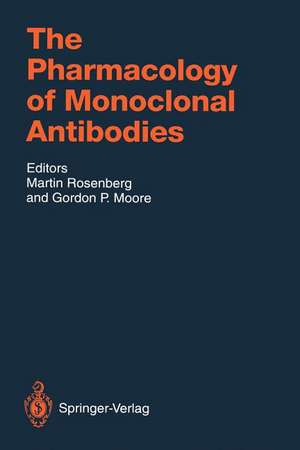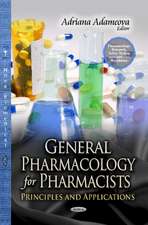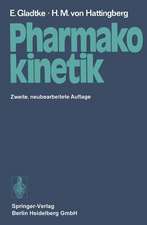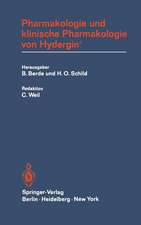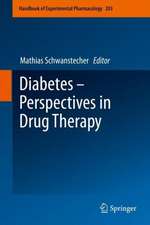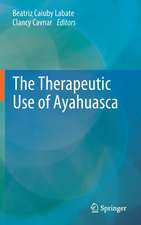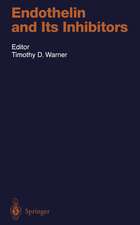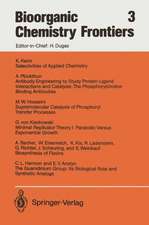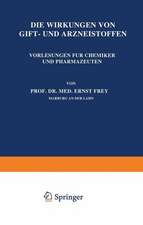The Pharmacology of Monoclonal Antibodies: Handbook of Experimental Pharmacology, cartea 113
Editat de Martin Rosenberg Contribuţii de R. Balint Editat de Gordon P. Moore Contribuţii de C.F. Barbas, R.D. Blumenthal, P. Carter, M. Chatterjee, Y.-C.Jack Chen, R.M. Conry, K.A. Foon, D.M. Goldenberg, E. Haber, M. Hein, A. Hiatt, K. James, K.D. Janda, K. Karjalainen, H. Kohler, J.W. Larrick, A.F. LoBuglio, N. Lonberg, G.E. Mark, E.A. Padlan, S.H. Pincus, A. Plückthun, M.L. Rodrigues, R.G. Rupp, M.N. Saleh, M.R. Shalaby, R.M. Sharkey, A. Trauneckeren Limba Engleză Paperback – 22 ian 2012
Din seria Handbook of Experimental Pharmacology
- 5%
 Preț: 3517.78 lei
Preț: 3517.78 lei - 5%
 Preț: 1425.97 lei
Preț: 1425.97 lei - 5%
 Preț: 1435.28 lei
Preț: 1435.28 lei - 5%
 Preț: 1430.52 lei
Preț: 1430.52 lei - 5%
 Preț: 1930.69 lei
Preț: 1930.69 lei - 5%
 Preț: 1922.47 lei
Preț: 1922.47 lei - 5%
 Preț: 1937.46 lei
Preț: 1937.46 lei - 5%
 Preț: 2117.58 lei
Preț: 2117.58 lei - 5%
 Preț: 2119.96 lei
Preț: 2119.96 lei - 5%
 Preț: 2117.38 lei
Preț: 2117.38 lei - 5%
 Preț: 1088.17 lei
Preț: 1088.17 lei - 5%
 Preț: 1098.27 lei
Preț: 1098.27 lei - 5%
 Preț: 1420.29 lei
Preț: 1420.29 lei - 5%
 Preț: 1104.84 lei
Preț: 1104.84 lei - 5%
 Preț: 1104.84 lei
Preț: 1104.84 lei - 5%
 Preț: 1108.14 lei
Preț: 1108.14 lei - 5%
 Preț: 1106.69 lei
Preț: 1106.69 lei - 5%
 Preț: 1105.77 lei
Preț: 1105.77 lei - 5%
 Preț: 1174.35 lei
Preț: 1174.35 lei - 5%
 Preț: 1432.50 lei
Preț: 1432.50 lei - 5%
 Preț: 408.48 lei
Preț: 408.48 lei - 5%
 Preț: 409.63 lei
Preț: 409.63 lei - 5%
 Preț: 539.90 lei
Preț: 539.90 lei - 5%
 Preț: 720.47 lei
Preț: 720.47 lei - 5%
 Preț: 733.09 lei
Preț: 733.09 lei - 5%
 Preț: 731.27 lei
Preț: 731.27 lei - 5%
 Preț: 746.43 lei
Preț: 746.43 lei - 5%
 Preț: 747.72 lei
Preț: 747.72 lei - 5%
 Preț: 725.24 lei
Preț: 725.24 lei - 5%
 Preț: 742.80 lei
Preț: 742.80 lei - 5%
 Preț: 393.23 lei
Preț: 393.23 lei - 5%
 Preț: 735.66 lei
Preț: 735.66 lei - 5%
 Preț: 728.33 lei
Preț: 728.33 lei - 5%
 Preț: 389.52 lei
Preț: 389.52 lei - 5%
 Preț: 730.71 lei
Preț: 730.71 lei - 5%
 Preț: 740.58 lei
Preț: 740.58 lei - 5%
 Preț: 730.19 lei
Preț: 730.19 lei - 5%
 Preț: 731.27 lei
Preț: 731.27 lei - 5%
 Preț: 726.68 lei
Preț: 726.68 lei - 5%
 Preț: 3516.49 lei
Preț: 3516.49 lei - 5%
 Preț: 729.26 lei
Preț: 729.26 lei - 5%
 Preț: 737.11 lei
Preț: 737.11 lei - 5%
 Preț: 730.92 lei
Preț: 730.92 lei - 5%
 Preț: 738.78 lei
Preț: 738.78 lei - 5%
 Preț: 909.94 lei
Preț: 909.94 lei - 5%
 Preț: 720.10 lei
Preț: 720.10 lei - 5%
 Preț: 734.74 lei
Preț: 734.74 lei - 5%
 Preț: 727.80 lei
Preț: 727.80 lei
Preț: 723.42 lei
Preț vechi: 761.49 lei
-5% Nou
Puncte Express: 1085
Preț estimativ în valută:
138.44€ • 144.00$ • 114.29£
138.44€ • 144.00$ • 114.29£
Carte tipărită la comandă
Livrare economică 14-28 aprilie
Preluare comenzi: 021 569.72.76
Specificații
ISBN-13: 9783642784347
ISBN-10: 3642784348
Pagini: 436
Ilustrații: XXI, 406 p.
Dimensiuni: 155 x 235 x 23 mm
Greutate: 0.61 kg
Ediția:Softcover reprint of the original 1st ed. 1994
Editura: Springer Berlin, Heidelberg
Colecția Springer
Seria Handbook of Experimental Pharmacology
Locul publicării:Berlin, Heidelberg, Germany
ISBN-10: 3642784348
Pagini: 436
Ilustrații: XXI, 406 p.
Dimensiuni: 155 x 235 x 23 mm
Greutate: 0.61 kg
Ediția:Softcover reprint of the original 1st ed. 1994
Editura: Springer Berlin, Heidelberg
Colecția Springer
Seria Handbook of Experimental Pharmacology
Locul publicării:Berlin, Heidelberg, Germany
Public țintă
ResearchCuprins
Section I: Human Monoclonal Antibodies.- 1 Human Monoclonal Antibody Technology.- 2 Recombinant Therapeutic Human Monoclonal Antibodies.- 3 Transgenic Approaches to Human Monoclonal Antibodies.- Section II: Genetically Engineered Monoclonal Antibodies.- 4 Humanization of Monoclonal Antibodies.- 5 Applications for Escherichia coli-Derived Humanized Fab’ Fragments: Efficient Construction of Bispecific Antibodies.- Section III: MAb Conjugates and Fusions.- 6 Immunotoxins.- 7 Antibody-Enzyme Fusion Proteins and Bispecific Antibodies.- 8 Three Generations of Recombinant CD4 Molecules as Anti-HIV Reagents.- Section IV: Combinatorial Libraries.- 9 Chemical and Biological Approaches to Catalytic Antibodies.- 10 The Combinatorial Approach to Human Antibodies.- Section V: Expression of MAbs/MAb Fragments.- 11 Antibodies from Escherichia coli.- 12 Structure, Function and Uses of Antibodies from Transgenic Plants and Animals.- 13 Some Aspects of Monoclonal Antibody Production.- Section VI: Medical Applications.- 14 Prospects for Cancer Imaging and Therapy with Radioimmunoconjugates.- 15 Clinical Experience with Murine, Human and Genetically Engineered Monoclonal Antibodies.- 16 Anti-idiotypic Monoclonal Antibodies: Novel Approach to Immunotherapy.
